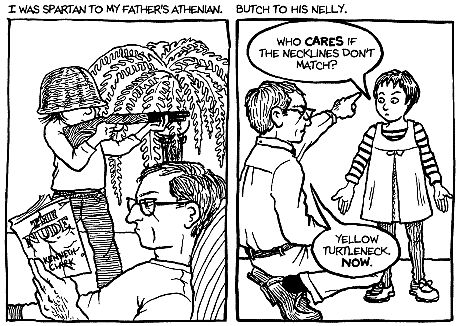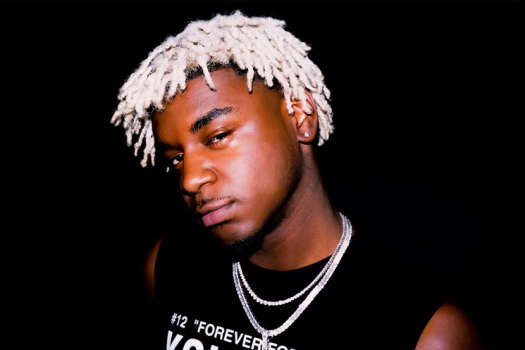When Alison Bechdel first took a tentative stab at drawing a comic strip, it came from a desire to see herself on the page. Not literally, per se, but her community, her lifestyle, her universe. That strip was Dykes To Watch Out For and she's drawn it bi-weekly since the early '80s (see sidebar). For her first graphic novel, Fun Home, she's once again putting herself on the page, this time in the form of her Pennsylvania upbringing and her distant yet influential relationship with her father.
Fun home was the kids' name for the funeral home where her father worked part-time; he was also an English teacher, where he mentored young men in particular in the ways of Joyce, Proust, Camus and Fitzgerald. Her father's hidden life was revealed to Bechdel, as she relates in the graphic novel/memoir, in a startling series of events when she was in college: she came out to her parents; she discovered that for years her father had been having affairs with young men; and he was killed (or committed suicide) when struck by a bread truck.
In her memoir, Bechdel connects to her father through literary commonalities. "It was three or four years into it when I realised the shape [the narrative] was going to take," she says, "that these chapters were cohering around different books or authors. My father loved to read, and as I worked on the book, I found myself quoting his favourite writers, reading their work ⎯ they were more and more an element, until I realised that they were actually becoming a structural part of the book."
For Bechdel ⎯ whose pre-teen bout with obsessive-compulsive disorder is chronicled in the book ⎯ the literary revelation meant an ongoing series of rewrites; in all, Fun Hometook seven years to complete. "There was a lot of retrofitting, for example around the whole Portrait of the Artist As A Young Man/Ulysses ideas that bookend it."
The OCD incident has passed, but its remnants have served Bechdel well; her attention to detail ⎯ which includes painstakingly recreating not only maps and objects, but also her father's handwriting ⎯ was accomplished through reference photographs, even posing herself for some images. The result is a simple, realist drawing style, augmented by a blue-hued wash on the black and white printing.
"I think my anxiety about getting things accurate, and my obsessiveness about it, is my personal stamp," she says. "In some ways, the whole book is an expanded version of my childhood journal; I was adding 'I think' or 'maybe' to my declarative sentences, to sort of undo them in case they weren't exactly true. I feel like that's what my process is in this book ⎯ I'm quite anxious about not telling the true story."
Fun Home manages both great breadth and startling intimacy; the scope of its literary ambitions is tempered by the precision of its specific moments, like when Bechdel realises that their childhood babysitter had been her father's lover. "I was working from certain core memories that I knew instinctively were part of the story," she says. "The book got built around those moments."
Though she had to smooth some familial feathers since the book's publication ⎯ its dedication reads "For mom, Christian and John. We did have a lot of fun, in spite of everything" ⎯ Bechdel, who's relatively soft-spoken and a bit shy in person, found the process of revelation easy, even exciting.
"I like not having a shield. I feel like I have this exhibitionist side I'm just starting to explore. This story wouldn't be interesting if it weren't absolutely true, which is another reason why I got so painstaking about establishing the limits of its truth. If I could make this story up, it wouldn't have the same meaning at all ⎯ I don't know if it would have any meaning. It would be clever but it wouldn't really signify anything."
Since its publication this spring, Fun Home has been acclaimed around the world; august literary journals have been including Bechdel's name in the context of graphic novels as a "new American literature," along with Craig Thompson (Blankets) and Marjane Satrapi (Persepolis). "I hadn't anticipated what it would be like to have the book be so successful. It's kind of amazing and I'm very grateful for it, but it's kinda weird too, to have people asking me about my family. It's disorienting to realise that people actually know these things about me ⎯ I forget that I've told them everything."
Moving into adulthood, and her own romantic career, will be the subject of Bechdel's next book, which she insists can't take another seven years. "It's going to be a memoir using the same technique of combining stories from my life with more essayistic digressions about ideas that I have. It will be a way of talking about ideas about subjectivity, about self and other, about why we get into relationships, while hanging that on stories from my own life and romantic career. My problem is, that story about my dad is an amazing story ⎯ I don't have a story like that. I have lots of little stories. The challenge will be to make those interesting in the telling. But I think I can."
Fun home was the kids' name for the funeral home where her father worked part-time; he was also an English teacher, where he mentored young men in particular in the ways of Joyce, Proust, Camus and Fitzgerald. Her father's hidden life was revealed to Bechdel, as she relates in the graphic novel/memoir, in a startling series of events when she was in college: she came out to her parents; she discovered that for years her father had been having affairs with young men; and he was killed (or committed suicide) when struck by a bread truck.
In her memoir, Bechdel connects to her father through literary commonalities. "It was three or four years into it when I realised the shape [the narrative] was going to take," she says, "that these chapters were cohering around different books or authors. My father loved to read, and as I worked on the book, I found myself quoting his favourite writers, reading their work ⎯ they were more and more an element, until I realised that they were actually becoming a structural part of the book."
For Bechdel ⎯ whose pre-teen bout with obsessive-compulsive disorder is chronicled in the book ⎯ the literary revelation meant an ongoing series of rewrites; in all, Fun Hometook seven years to complete. "There was a lot of retrofitting, for example around the whole Portrait of the Artist As A Young Man/Ulysses ideas that bookend it."
The OCD incident has passed, but its remnants have served Bechdel well; her attention to detail ⎯ which includes painstakingly recreating not only maps and objects, but also her father's handwriting ⎯ was accomplished through reference photographs, even posing herself for some images. The result is a simple, realist drawing style, augmented by a blue-hued wash on the black and white printing.
"I think my anxiety about getting things accurate, and my obsessiveness about it, is my personal stamp," she says. "In some ways, the whole book is an expanded version of my childhood journal; I was adding 'I think' or 'maybe' to my declarative sentences, to sort of undo them in case they weren't exactly true. I feel like that's what my process is in this book ⎯ I'm quite anxious about not telling the true story."
Fun Home manages both great breadth and startling intimacy; the scope of its literary ambitions is tempered by the precision of its specific moments, like when Bechdel realises that their childhood babysitter had been her father's lover. "I was working from certain core memories that I knew instinctively were part of the story," she says. "The book got built around those moments."
Though she had to smooth some familial feathers since the book's publication ⎯ its dedication reads "For mom, Christian and John. We did have a lot of fun, in spite of everything" ⎯ Bechdel, who's relatively soft-spoken and a bit shy in person, found the process of revelation easy, even exciting.
"I like not having a shield. I feel like I have this exhibitionist side I'm just starting to explore. This story wouldn't be interesting if it weren't absolutely true, which is another reason why I got so painstaking about establishing the limits of its truth. If I could make this story up, it wouldn't have the same meaning at all ⎯ I don't know if it would have any meaning. It would be clever but it wouldn't really signify anything."
Since its publication this spring, Fun Home has been acclaimed around the world; august literary journals have been including Bechdel's name in the context of graphic novels as a "new American literature," along with Craig Thompson (Blankets) and Marjane Satrapi (Persepolis). "I hadn't anticipated what it would be like to have the book be so successful. It's kind of amazing and I'm very grateful for it, but it's kinda weird too, to have people asking me about my family. It's disorienting to realise that people actually know these things about me ⎯ I forget that I've told them everything."
Moving into adulthood, and her own romantic career, will be the subject of Bechdel's next book, which she insists can't take another seven years. "It's going to be a memoir using the same technique of combining stories from my life with more essayistic digressions about ideas that I have. It will be a way of talking about ideas about subjectivity, about self and other, about why we get into relationships, while hanging that on stories from my own life and romantic career. My problem is, that story about my dad is an amazing story ⎯ I don't have a story like that. I have lots of little stories. The challenge will be to make those interesting in the telling. But I think I can."




